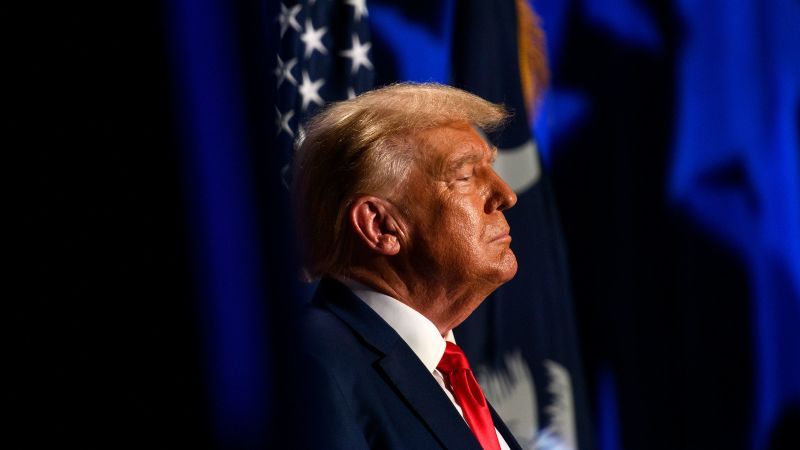Title: The Republican Shift: Understanding the Impact of Trump’s Indictments and Growing Alienation
Subtitle: Exploring the Erosion of Trust in Institutions and the Future of the GOP
Introduction:
Discover the deep-seated belief among GOP voters that they are the real victims of bias and discrimination, as we delve into the upcoming debate among Republican presidential candidates. Uncover how Trump’s ability to tap into this sentiment has solidified his position as the frontrunner, despite facing multiple criminal indictments. Explore the rejection of these charges within the GOP base and its reflection of a broader trend of alienation from major institutions and a deep-rooted distrust in the federal government. Brace yourself for a turning point in the Republican coalition, signaling continued turbulence in the years to come.
The Changing Perception of the FBI:
Unveil the Republican hostility towards federal law enforcement, with a focus on the FBI. Understand how the bureau’s involvement in the Trump-Russia investigation and the decision not to prosecute Hillary Clinton have fueled skepticism among conservatives. Witness the shift from viewing the agency as defenders against leftist militants to a source of doubt and suspicion.
Loss of Confidence in Institutions:
Explore the erosion of trust in federal law enforcement agencies and its impact on other institutions such as the Justice Department, election officials, and judges. Grasp the concerning trend of Republicans losing faith in the very institutions that uphold the rule of law, leaving a void of trust and a sense of alienation.
Skepticism Towards “Elites”:
Uncover the growing skepticism among Republicans towards various institutions and groups categorized as “elite.” Delve into the decline in trust towards scientists, medical professionals, media organizations, public schools, and the criminal justice system. Understand how this skepticism extends beyond expected targets, shaping conservative attitudes towards the world around them.
Demographic and Political Transformation:
Unravel the anxiety about cultural shifts and demographic changes that have further alienated Republicans from institutions. Examine how Republican voters believe they face more discrimination than historically marginalized groups, fueling a sense of victimhood and a desire for protection. Grasp the impact of these changes on the Republican coalition and the future of the party.
The Impact of Trump’s Rhetoric:
Unveil Trump’s skillful manipulation of fears and insecurities, portraying conservatives as the real victims of bias. Understand how his rhetoric resonates with Republicans, offering them a sense of superiority and righteousness. Witness the personal connection that many GOP voters have with Trump and how it influences their dismissal of the charges against him.
Conclusion:
Gain a comprehensive understanding of the Republican shift in attitudes towards federal law enforcement and institutions. Recognize the complex factors influencing this shift, including demographic changes, political transformation, and Trump’s rhetoric. Grasp the implications of this shift for the current political landscape and the future of the Republican Party. Brace yourself for continued turbulence and the erosion of trust in American democracy.
Title: The Intriguing Factors Fueling Republican Voters’ Trust in Trump
Introduction:
In the realm of American politics, few figures have elicited such strong emotions and polarized opinions as former President Donald J. Trump. Despite his controversial tenure, a significant portion of Republican voters continue to place their trust in him. This article aims to explore the intriguing factors that fuel Republican voters’ unwavering support for Trump, delving into the psychological, ideological, and socio-economic aspects that contribute to this phenomenon.
1. Populist Appeal:
One of the key factors behind Trump’s enduring support lies in his populist appeal. Trump’s ability to connect with working-class Americans, particularly in rural areas, resonated with those who felt neglected by the political establishment. His unfiltered rhetoric and promises to “drain the swamp” tapped into a deep-seated frustration with the status quo, making him an attractive candidate for those seeking change.
2. Economic Promises:
Trump’s emphasis on economic growth and job creation struck a chord with many Republican voters. His business background and promises to renegotiate trade deals, reduce regulations, and bring back manufacturing jobs appealed to those who felt left behind by globalization. Trump’s tax cuts and deregulation policies were seen as pro-business, fostering an environment conducive to economic prosperity.
3. Conservative Values:
Trump’s alignment with conservative values, particularly on issues such as abortion, gun rights, and religious freedom, solidified his support among Republican voters. His appointment of conservative judges, including three Supreme Court justices, reassured conservatives that their values would be upheld and protected. Trump’s unwavering stance on these issues endeared him to many who saw him as a defender of traditional American values.
4. Media and Perception:
The role of media cannot be underestimated in shaping public opinion. Trump’s relentless attacks on mainstream media outlets as purveyors of “fake news” resonated with Republican voters who felt their concerns were being dismissed or misrepresented. The perception of media bias against Trump further solidified his support base, as voters sought alternative sources of information that aligned with their views.
5. Identity Politics:
Trump’s ability to tap into identity politics played a significant role in his support among Republican voters. His strong stance on immigration, border security, and national identity appealed to those who felt threatened by demographic changes and the perceived erosion of American culture. Trump’s “America First” rhetoric resonated with voters who believed their interests were being overlooked in favor of global concerns.
Conclusion:
The factors fueling Republican voters’ trust in Trump are multifaceted and complex. Trump’s populist appeal, economic promises, alignment with conservative values, media perception, and ability to tap into identity politics all contributed to his enduring support base. Understanding these factors is crucial for comprehending the dynamics of American politics and the motivations behind the unwavering loyalty of Republican voters to the former president. As the political landscape continues to evolve, it remains to be seen how these factors will shape the future of the Republican Party and its relationship with Trumpism.








